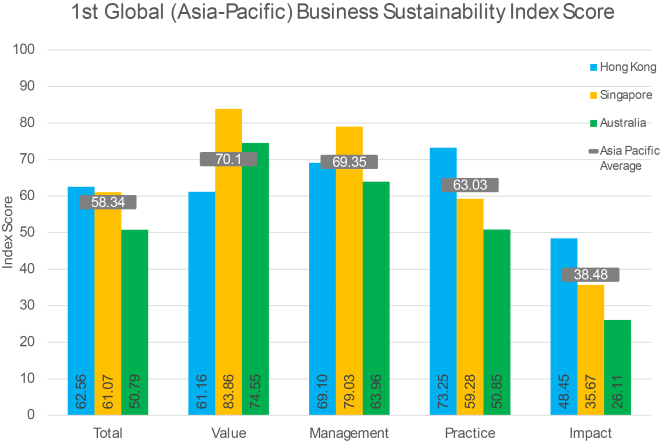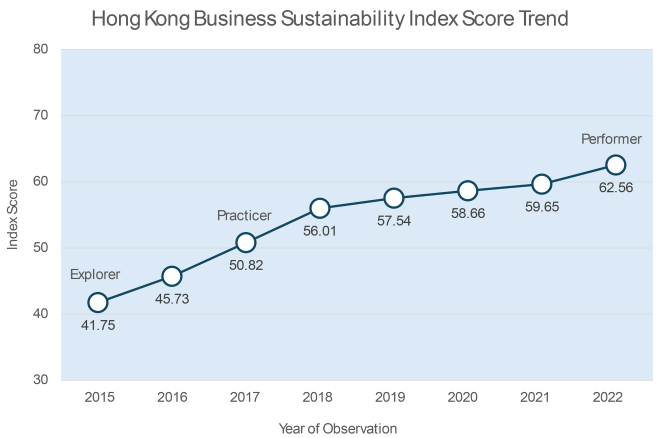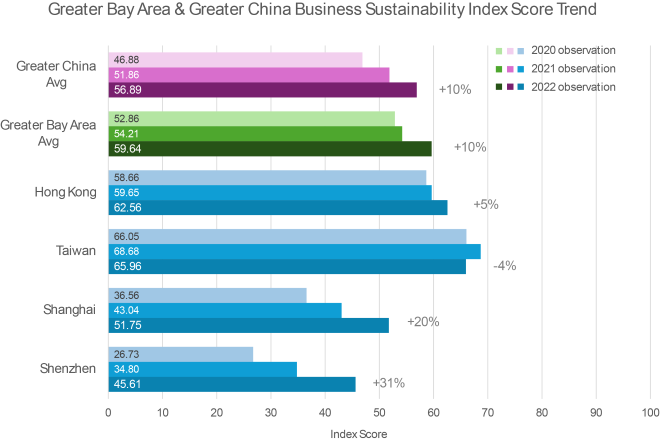08 Apr Promising sustainability trends in Asia Pacific revealed in Business Sustainability Indices 2023
[The content of this article has been produced by our advertising partner.]
The Chinese University of Hong Kong Business School’s Centre for Business Sustainability (CBS)’s BSI 2023, released last November, unveiled encouraging sustainability trends in the Asia Pacific region. The indices assess the performance of 371 listed companies in Hong Kong, Greater Bay, Greater China, Singapore, and Australia and highlight significant advancements in sustainability practices.

Hong Kong among top performers
“With our inaugural Global (Asia Pacific) BSI, Hong Kong companies are ranked as the top performers in the region with an overall average score of 62.56 points, particularly in addressing government in their sustainability practices,” says Professor Carlos Lo, CBS’ Director and Head of the Department of Government and Public Administration at The Chinese University of Hong Kong, who spearheaded the BSI project. Notably, Hong Kong also ranked among the top ten companies in the region. “The Hong Kong Business Sustainability Index (HKBSI) showed an overall increase in average scores, entering the ‘Performer’ grade range (60-69 points) for the first time. The Greater Bay Area and Greater China also recorded improvements in sustainability performance, with scores of 59.64 and 56.89 points, respectively. Companies in Shanghai, Shenzhen, and Taiwan showcased significant progress, highlighting the role of innovation, specialised talent, and regulatory incentives in driving sustainability practices,” adds Professor Lo.

Comprehensive assessment beyond compliance
“The assessment process focuses on measuring companies’ impact and performance in terms of sustainability. It aims to provide feedback to companies, highlighting their strengths, weaknesses, and areas for improvement. The assessment reports are shared with the companies free of charge to encourage collaboration and improvement,” explains Professor Lo.
The BSI is the only index of its kind created by an academic institution worldwide. It differentiates itself by focusing on sustainable performance beyond compliance. SGS Hong Kong, the world’s leading testing, inspection, and certification company, is its technical partner.
Companies are awarded zero points for mere compliance and negative scores for subpar performance. The emphasis is on going beyond legal requirements and adopting holistic sustainability strategies. Established in 2015, the BSI project initially included only Hong Kong but expanded to encompass the Greater Bay Area and Greater China in 2020 and 2021, respectively, and the Asia Pacific region in 2023, setting it well on a global pathway.
Encouraging progress and challenges
“The progress being made in Greater China is encouraging, with clear visions, corporate policies, and management structures. However, many companies have yet to conduct comprehensive performance evaluations and assess the alignment between their actions and their strategies or expectations,” says Professor Lo.
Surprisingly, Singaporean companies, expected to outperform those in the Asia Pacific region, demonstrated a high standard but may need more motivation to improve. “In contrast, Hong Kong companies are driven to perform better, possibly as a result of the growing regulatory requirements on ESG disclosure from the Hong Kong Stock Exchange, and seeing sustainability as a means to enhance their competitive advantage and explore new business directions,” adds Professor Lo.

Addressing the knowledge gap
“While progress is being made, only a small percentage of companies actively engage in the assessment process; many have yet to conduct comprehensive evaluations of their performance and assess the alignment between their actions and their strategies or expectations,” states Professor Lo.
To address challenges in sustainability performance, particularly the shortage of professionals in the field, he advocates establishing sustainability as a recognised profession with universities offering talent development programmes. In line with this, CUHK will start an MSC programme in Sustainable Global Business focusing on sustainability strategy and management of sustainable business in September 2024 to groom professionals who can assist companies in improving their performance, enhancing profitability, and meeting sustainability challenges.
Strategic Sustainability Benchmark Scheme

Companies not included in the BSI can take advantage of CUHK Business School’s Strategic Sustainability Benchmark Scheme, open to companies from Hong Kong and elsewhere.
Partnered with SGS Hong Kong, the scheme leverages the expertise of CBS’s recognised research methodology and framework in assessing business sustainability and SGS’s independent verification.
Backed by statistics, the assessment provides timely feedback and supports efficient sustainability strategy building and decision-making.
The certification helps companies understand their performance level and compare it to benchmark companies on the BSI. “By offering comprehensive data for research purposes, this scheme contributes to academic understanding and facilitates benchmarking against participating companies,” explains Professor Lo.
Ensuring long-term impact and transparency
“Future BSI reports will strive for enhanced transparency, ranking all participating companies rather than just the top 20. This expanded approach will provide comprehensive insights, benefiting companies, investors, and internal stakeholders alike,” he adds.
The BSI project relies on funding from various sources, including government support, university backing, and industry donations, to ensure long-term continuity and impact. “Exploring potential business models and identifying sponsors will further enable the project’s sustainability,” says Professor Lo.
Collaboration for a sustainable future
The BSI project is a significant step towards promoting sustainable business practices in Hong Kong and beyond. Equipping companies with essential tools and insights drives positive change and contributes to a more sustainable future in the region. However, Professor Lo concludes that collaboration with stakeholders, a commitment to sustainability as a core principle, and increased transparency are pivotal for businesses to advance towards a truly sustainable future.
